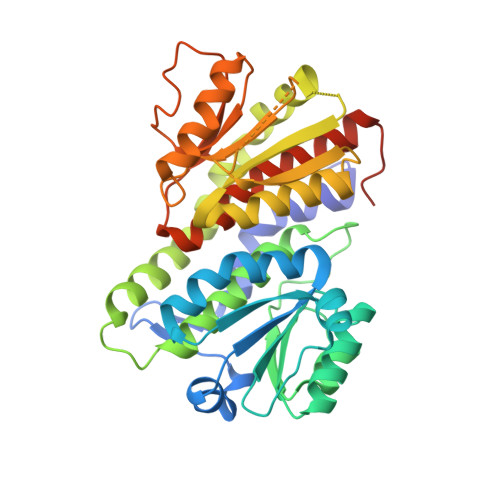The Crystal and Solution Studies of Glucosamine-6-phosphate Synthase from Candida albicans
Raczynska, J., Olchowy, J., Konariev, P.V., Svergun, D.I., Milewski, S., Rypniewski, W.(2007) J Mol Biol 372: 672-688
- PubMed: 17681543
- DOI: https://doi.org/10.1016/j.jmb.2007.07.002
- Primary Citation of Related Structures:
2POC, 2PUT, 2PUV, 2PUW - PubMed Abstract:
Glucosamine 6-phosphate (GlcN-6-P) synthase is an ubiquitous enzyme that catalyses the first committed step in the reaction pathway that leads to formation of uridine 5'-diphospho-N-acetyl-D-glucosamine (UDP-GlcNAc), a precursor of macromolecules that contain amino sugars. Despite sequence similarities, the enzyme in eukaryotes is tetrameric, whereas in prokaryotes it is a dimer. The activity of eukaryotic GlcN-6-P synthase (known as Gfa1p) is regulated by feedback inhibition by UDP-GlcNAc, the end product of the reaction pathway, whereas in prokaryotes the GlcN-6-P synthase (known as GlmS) is not regulated at the post-translational level. In bacteria and fungi the enzyme is essential for cell wall synthesis. In human the enzyme is a mediator of insulin resistance. For these reasons, Gfa1p is a target in anti-fungal chemotherapy and in therapeutics for type-2 diabetes. The crystal structure of the Gfa1p isomerase domain from Candida albicans has been analysed in complex with the allosteric inhibitor UDP-GlcNAc and in the presence of glucose 6-phosphate, fructose 6-phosphate and an analogue of the reaction intermediate, 2-amino-2-deoxy-d-mannitol 6-phosphate (ADMP). A solution structure of the native Gfa1p has been deduced using small-angle X-ray scattering (SAXS). The tetrameric Gfa1p can be described as a dimer of dimers, with each half similar to the related enzyme from Escherichia coli. The core of the protein consists of the isomerase domains. UDP-GlcNAc binds, together with a metal cation, in a well-defined pocket on the surface of the isomerase domain. The residues responsible for tetramerisation and for binding UDP-GlcNAc are conserved only among eukaryotic sequences. Comparison with the previously studied GlmS from E. coli reveals differences as well as similarities in the isomerase active site. This study of Gfa1p focuses on the features that distinguish it from the prokaryotic homologue in terms of quaternary structure, control of the enzymatic activity and details of the isomerase active site.
Organizational Affiliation:
Institute of Bioorganic Chemistry, Polish Academy of Sciences, ul. Noskowskiego 12/14, 61-704 Poznan, Poland.
















